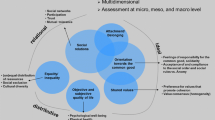Abstract
Cultural theory works with a parsimonious model of four cultural types, each emanating from a specific form of organisation. The four types are identified as attitudes and values that justify the organisation. The hierarchical type, with its ranked levels and symmetrical branchings, depends on the adoption of hierarchical values and the expression of matching judgements. Likewise for the enclavist culture, the individualist culture and that of the isolates. There is no assumption of fixity, on the contrary, the four types are represented in any community, and social life is in permanent tension and flux. This article gives a summary of the early history of the theory.
Similar content being viewed by others
References
Bloor D., 1982: Polyhedra and the abominations of Leviticus, cognitive styles in mathematics. In: Douglas, M. (ed.), Essays in the Sociology of Perception. Routledge, London, pp. 191-218.
Dake K., 1991: Orienting dispositions in the perception of risk: an analysis of contemporary world views and cultural biases. J. Cross-Cultural Psychol., 22: 61-82.
Dake K. & Thompson M., 1993: The Meanings of sustainable development: household strategies for managing needs and resources. In: Wright, S.D. et al. (eds), Human Ecology: Crossing Boundaries. The Society for Human Ecology, Fort Collins, CO, pp. 421-436.
Dennett D.C., 1987: The intentional Stance. MIT Press, Cambridge, Mass.
Douglas M., 1985: Risk Acceptability According to the Social Sciences. Russell Sage Foundation, New York.
Douglas M., 1992: In defence of shopping. In: Eisendle, R.; Miklautz, E. (eds.), Produktkulturen und Bedeutungswendel des Konsums. Campus, Frankfurt, pp. 95-117. (also chapter in Thought styles, Critical essays on good taste. Sage, London 1996, pp. 77–105.
Grendstad G. & Selle P. (eds.), 1996: Kultur som Levemåte. Samlaget, Oslo.
Gross J. and Rayner S., 1985: Measuring culture: a paradigm for the analysis of social organisation. Columbia University Press, New York.
Habermas J., 1987: Theorie des kommunikativen Handelns. Bd 2 (vierte Auflage). Suhrkamp, Frankfurt am Main.
Karmasin H. & Karmasin M., 1997: Cultural Theory. Ein neuer Ansatz für Kommunikation, Marketing und Management. Linde Verlag, Wien.
Marris C., Langford I. & O'Riordan T., 1996: Integrating sociological and psychological approaches to public perceptions of environmental risks: Detailed results from a questionnaire survey, CSERGE Working Paper GEC 96-07, The Centre for Social and Economic Research on the Global Environment, University of East Anglia, Norwich, England.
Prêtre S., 1989: Nucléaire, symbolisme et société: contagion mentale ou conscience des risques. SFEN, Paris.
Rayner S., 1982: The Perception of Time and Space in Egalitarian Sects: A Millenarian Cosmology. In: Douglas, M. (ed.), Essays in the Sociology of Perception. Routledge & Kegan Paul, London, pp. 247-274.
Rayner S., 1988: The rules that keep us equal. In: Flanagan J.G. & Rayner S. (eds), Rules, Decisions and Inequalities in Egalitarian Societies. Aldershot, Avebury, pp. 40-42.
Rayner S., 1991: A Cultural Perspective on the structure and implementation of global environmental agreements. Eval. Rev. 15: 75-102.
Schwarz M. & Thompson M., 1990: Divided We Stand: Redefining Politics, Technology and Social Choice. Harvester Wheatsheaf, Hemel Hempstead.
Thompson M., 1979: Rubbish Theory: The Creation and Destruction of Value. Oxford University Press, Oxford.
Thompson M., Ellis R. & Wildasvky A., 1990: Cultural Theory. Westview Press, Boulder, CO.
Author information
Authors and Affiliations
Rights and permissions
About this article
Cite this article
Douglas, M. Four cultures: the evolution of a parsimonious model. GeoJournal 47, 411–415 (1999). https://doi.org/10.1023/A:1007008025151
Issue Date:
DOI: https://doi.org/10.1023/A:1007008025151




